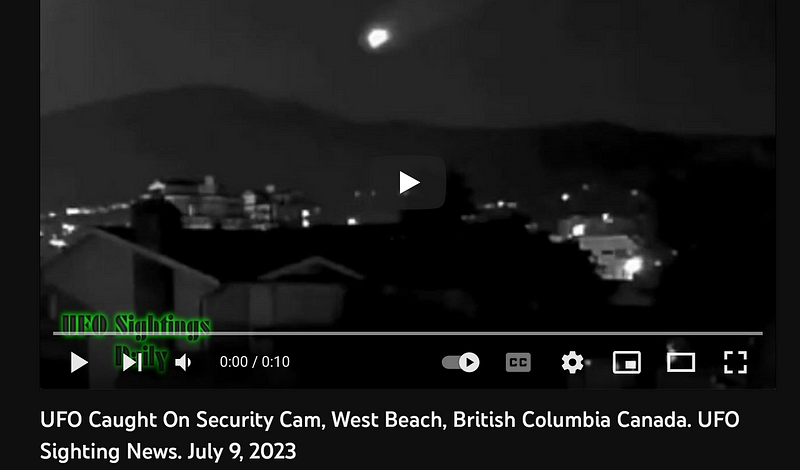The Skepticism Surrounding UFOs: A Deep Dive into the Debate
Written on
Chapter 1: The Current Climate on UFOs
The ongoing debate surrounding UFOs, or as they are now termed UAPs (Unidentified Aerial Phenomena), reveals a noticeable resistance among skeptics. This skepticism is often laced with sarcasm, as seen in the remarks of former astronaut and Arizona Senator Mark Kelly. His dismissive attitude reflects a broader trend where those in positions of authority display contempt for the UFO discourse. Andrew Stuttaford's article begins with a pointed observation: “The current surge of interest in UFOs still seems strong enough for politicians to think that they should get involved….” His tone leaves little room for civility; skepticism is one thing, but outright disdain is another.

Some might argue that Stuttaford's sarcasm stems from genuine disbelief in the recent rebranding of UFOs as UAPs. It's reminiscent of Pluto's controversial demotion from planetary status—once a planet, now not. He may be critiquing the newfound seriousness surrounding UFO reports, yet his tone suggests a lack of understanding or acceptance of the phenomena.
The government’s position raises further questions. Specifically, the concept of "eminent domain" implies that federal authorities could lay claim to any recovered alien technology or biological evidence of non-human intelligence, even if held by private entities. This could signal troubling intentions, leading to speculation that delays in releasing UFO files are motivated by a desire to retain control over such discoveries.
Senator Kelly's claims of never having witnessed anything unexplainable raise eyebrows. If civilians can identify anomalies in ISS feeds, one must wonder why he, with his insider knowledge, has not encountered similar phenomena. Has he not discussed these matters with fellow astronauts, many of whom have reportedly seen unexplained events? His reluctance to acknowledge any unusual sightings only reinforces the idea that he is perhaps too entrenched in traditional views.
Robert Clotworthy from Ancient Aliens claims to have spoken with NASA personnel who have firsthand accounts of unsettling experiences, including astronauts declaring, “I am not alone.” How can these narratives exist while Kelly maintains his skepticism?
Section 1.1: The Nature of UFO Sightings
Whether an object in the sky is a UFO or merely a meteor is open to interpretation. Yet, some recent sightings appear too substantial to be dismissed as mere meteorological phenomena. If it were an extraterrestrial craft, one must consider its advanced capabilities, such as stopping abruptly in mid-air—one of five observed characteristics of UFOs.
Reports of military encounters suggest that these objects can maneuver at incredible speeds, even underwater, which is something current human technology cannot replicate.
Subsection 1.1.1: The Need for Transparency
In light of these considerations, if Kelly and others are correct in their skepticism, why aren't they advocating for the declassification of UFO documents? Instead of dismissing the issue, they should be urging the government to release all available information to clarify the matter once and for all.
The persistence of conspiracy theories often stems from a lack of trust in government transparency. Historical instances of deception only fuel public skepticism—after all, the New York Times has documented numerous government lies. It seems odd that Kelly refuses to entertain the possibility that UFO enthusiasts might have valid points.
Section 1.2: The Role of Media and Public Perception
Chapter 2: Public Skepticism and Government Accountability
The call for the government to disclose UFO-related documents has never been more urgent. The public deserves access to this information, especially when it comes to past ISS feed interruptions.
When science suggests that even mundane objects can pose risks to space habitats, one would expect a thorough investigation of all aerial phenomena. The skepticism should be directed towards those who have historically misled the public.
In a climate where media outlets often align with corporate and governmental interests, it's no wonder more people are turning to independent sources for information on UFOs. As long as dismissive articles continue to circulate, public trust in the government will likely continue to erode.